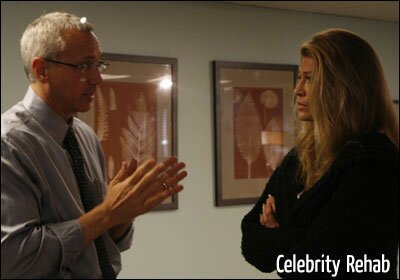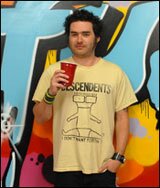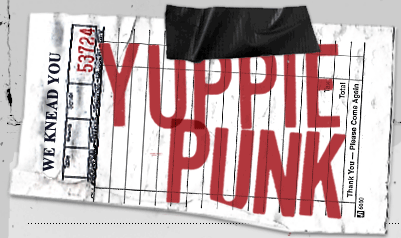Top 10 Unscripted TV Series of 2008

Though it was a crummy year for scripted television (“Knight Rider,” anyone?), non-fiction TV provided plenty of viewing pleasures. “Project Runway,” “Top Chef,” and “Flipping Out” on Bravo each provided hours of pleasure, as did “Survivor,” “The Amazing Race” and “American Idol,” broadcast TV’s best unscripted offerings. But to really find the best of the genre, you’ll have to watch PBS and cable. From the high seas to high celebrities, here’s a look at our ten favorite unscripted series of 2008.
“Independent Lens” (PBS)
Hosted by actor Terence Howard, the show’s tagline is “A film festival in your living room,” and that’s pretty accurate, particularly since many of the documentaries shown on this weekly PBS series are actually featured at festivals around the world. From films that track an ear of corn’s journey from crop to dinner table (“King Corn”) to the history of a popular font (“Helvetica”), this season’s featured flicks have a breadth and depth that was unparalleled on television. Only HBO’s slate of summer documentaries even came close.
“Whale Wars” (Animal Planet)
In the vein of “Deadliest Catch” and “Ice Road Truckers,” the series follows the members of the Sea Shepherd Society, a controversial group of eco-terrorists, as they attempt to protect the Australian seas from Japanese whaling vessels by any means necessary. Whether by illegal boarding, disabling propellers or hurling stink bombs of butyric acid aboard enemy ships, this is high-stakes hjinks on the high seas — a real-life game of cat and mouse, and one seriously compelling piece of non-fiction TV.
“Celebrity Rehab with Dr. Drew” (VH1)
This show is as hard to quit as the substances its celebrities are addicted to. Last season laid the groundwork, but Season 2 is like a pain killer for boring TV. Eight “celebrities” with varying degrees of substance abuse issues check into a real rehab where they’re treated by Dr. Drew Pinsky, an addiction medicine specialist, and former host of MTV’s “Loveline.” If last season’s breakout star was Jeff Conaway of “Taxi” and “Grease” fame (who’s back again for treatment), this season’s crowd-pleaser is Gary Busey, who insists he’s a participant in the series, not a patient. “My sobriety is safe,” he tells Dr. Drew, upon check-in, before cornering other cast members and hurling his “Buseyisms” at them (Sober stands for Son Of a Bitch, Everything’s Real). Other cast members include Rodney King, model/actress Amber Smith, original Guns N’ Roses drummer Steven Adler and Sean Stewart, son of rocker Rod Stewart. Is it exploitative? Sure, but at least it has a heart, which is more than you can say for most shows of its ilk. And Dr. Drew (whose muscular physique is strangely off-putting) adds the anchor of seriousness the show needs.
“Dragon’s Den” (BBC America)
We’ve been completely obsessed with “Dragon’s Den,” a British program airing now on BBC America, in which entrepreneurs pitch ideas to investors in hopes of securing financing. It’s alluringly simple and utterly addictive. The format is a hit not just in Britain, but Japan, Australia and elsewhere, and Mark Burnett is developing an American version called “The Shark Tank.” And hopefully Burnett won’t screw it up by attaching The Donald or Mark Cuban or Richard Branson to the American version, as part of the fun of the British series is that none of the investors’ personalities eclipse anyone else’s.
 “NOFX: Backstage Passport” (FUSE)
“NOFX: Backstage Passport” (FUSE)
After growing tired of touring the same boring places year after year, the potty-mouthed political punks known as NOFX set out to play in every country they’d always wanted to visit in hopes of playing shows the way they used to in their early days — chaotic and exciting. “When you play weird crazy cities, crazy shit is going to happen,” Fat Mike, the band’s leader says as he outlines some of the destinations they’ll be hitting on the extended excursion: China, Peru, Israel, Russia. Like NOFX’s live shows, “Backstage Passport” is only partially about the music. Much of the enjoyment comes from simply watching the band, and in this case, their crew, interact with one another. The band’s music, though featured throughout the episodes, isn’t at the center of the series. What emerges instead is a series about the predicaments these guys manage to get themselves into — and even more impressively, out of.
“Survivorman” (Discovery)
There’s only one true champion of survivalist-TV, and his name is Les Stroud. His fellow TV survivalist, Bear Grylls, who stars in “Man vs. Wild” on the same network, may be younger, better looking and British, but it’s Stroud whose one-man show is the crème de la crème of the genre. Stroud is the real deal. He strands himself in the wild (this season he tackles the terrains of the Arctic tundra, the Australian Outback and Papua New Guinea, among others) with nothing but 50 pounds of camera gear, a harmonica and a multi-use tool to act as both star and director, surviving for seven days in the wild. The show’s third season, which has just begun, will, sadly, be its last. “I’m pleased with what I have done,” he told Reuters recently. “I’ve been copied around the world, but 25 times I’ve not eaten anything for a week while sleeping on rocks. I need to move on.”
“Architecture School” (Sundance)
The series follows Tulane University architecture students as they design and build a low income home in New Orleans’ Ninth Ward, a section of the city that was particularly ravaged by Hurricane Katrina. The series falls a bit short because it doesn’t spend enough time on developing its characters, but eventually succeeds because the design and building process is interesting.
“Frontline” (PBS)
This 25-year-old public affairs series informs while it entertains, particularly when tackling politics. “Bush’s War” chronicled the story behind the Iraq War both on the ground and behind closed doors, while “The Choice 2008,” which told the stories of Senators John McCain and Barack Obama from childhood to election, served as a poignant portrait of both candidates just prior to the election. Also excellent this season was “Young and Restless in China,” a documentary tracking nine Chinese grappling with life in the fastest-evolving society in history.
“Intervention” (A&E)
Though it profiles addicts during their lowest of lows, the series somehow never feels exploitative. Perhaps that’s because most of the stories we see have a happy(ish) ending. We’ve seen people grappling with nearly every form of addiction — booze, shopping, gambling, cutting — and despite the addiction, the pain these diseases cause in their families and loved ones is always the same. The episodes may be depressing, but at least they may serve as a warning call to others who are suffering, and who because of the series, may decide to prevent some of the hardships the series puts on display.
“True Life”
“The Hills” and “The Real World” might get all the press, but MTV’s decade-old documentary series, produced by MTV’s news division, is the real non-scripted star of the network. Tackling topics both important and frivolous in episodes like “I’m in the Sex Industry” and “I Have Schizophrenia,” the John Norris-narrated series takes an honest look at real-life teens without sanitizing or dramatizing them. The series is Emmy-nominated, and has won a handful of awards including a GLAAD Media award and a Prism award, which promotes the depiction of accurate health and social issues in entertainment. And that’s more than you can say about Speidi.
RELATED: Top 10 Live TV Streakers | Top 10 Caught-on-Tape Celebrity Tirades






